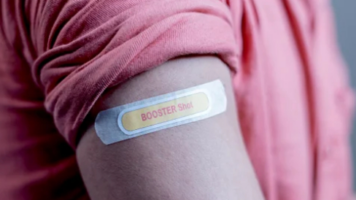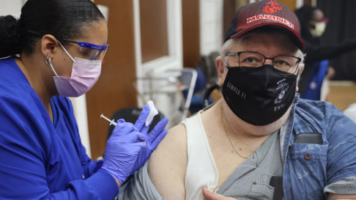COVID-19 News
COVID-19 Update | April 7, 2023
April 7, 2023

COVID-19 Update | April 7, 2023
The California Biotechnology Foundation is committed to keeping you up to date about COVID-19 testing, treatment and prevention advancements. The following resources track what progress has been made as of April 7, 2023. Notable advancements include:
- In a recent study monoclonal antibody treatments were found to reduce risk of hospitalizations and death against Alpha, Delta, and Omicron COVID-19 variants.
- The U.S. Food and Drug Administration (FDA) plans to authorize a second bivalent COVID-19 booster vaccine for older adults and immunocompromised Americans.
- New research in the Journal of Internal Medicine suggests that a drug used to treat liver disease may decrease COVID-19 infections and reduce the severity of COVID-19.
Recent News
- mAb therapy reduces risk of hospitalization and death against Alpha, Delta, and Omicron variants
News Medical Life Sciences – April 6, 2023
The use of mAb treatment has been shown to reduce severe acute respiratory syndrome COVID-19 2 (SARS-CoV-2) viral load and subsequently lead to lower rates of COVID-19-related hospitalization and death among high risk patients as compared to those who did not receive the treatment. The benefit of mAb treatment appears to be greatest in patients over 65 years old and those with a weakened immune system. Observational clinical data on the use of mAb products among COVID-19 patients, particularly following the emergence of the Omicron variant, are scarce. Thus, there remains an urgent need to examine the efficacy of individual mAb products against new SARS-CoV-2 variants to identify patient populations that will benefit most from mAb treatment. - Is the new COVID-19 variant the ‘one to watch’?
Advisory Board – April 6, 2023
A new COVID-19 variant, XBB.1.16 or “Arcturus,” has emerged, and the World Health Organization (WHO) has labeled it as a variant “to watch” as it drives a new increase in cases in India and spreads to more countries worldwide, including the United States. XBB.1.16 is a recombinant variant, meaning it evolved from two other variants, likely when a single person was infected by two or more coronavirus variants at the same time. XBB.1.16 evolved from BA.2.10.1 and BA.2.75. Compared to the parent XBB lineage, XBB.1.16 has three additional mutations on its spike protein. Although this newest variant is similar to XBB.1.5, which currently makes up around 85% of U.S. cases and 45% of global cases, XBB.1.16 has an additional mutation that has been associated with increased infectivity and a potential increase in pathogenicity. - COVID-19 vaccine nasal spray shows strong immune response in study: ‘Could be a game changer’
Fox News – April 6, 2023
A new study has shown promising results for a nasal COVID-19 vaccine, according to researchers at the Institute of Virology at Freie Universität Berlin in Germany. The study was published in the journal Nature Microbiology. Today, there are four approved COVID-19 vaccines in the U.S. — all of which are administered via injection into the muscle, per the Centers for Disease Control and Prevention (CDC). The nasal vaccines have significant advantages over the injectable vaccines that are currently available, Dr. Trimpert said. “An intra-nasally applied live-attenuated vaccine provides superior protection against SARS-CoV-2 infection compared to intramuscularly applied vaccines,” he told Fox News Digital. - California COVID-19 rules ease as emergency declarations end. Here’s what’s changed
The Los Angeles Times – April 5, 2023
The steady unwinding of COVID-19 emergency declarations has ushered in a slate of changes to Los Angeles County’s pandemic guidance, including when to mask, quarantine or isolate, as well as the reporting of new infections and outbreaks. The most significant — the easing of government-issued masking orders for patients and visitors in healthcare settings — took effect Monday in L.A. County. In other California counties, masking orders for doctors and nurses also have expired. The tweaks are the latest reflection of a broad new phase of the pandemic, one characterized more by individual risk assessment and targeted intervention than sweeping measures or restrictions. - FDA Authorizes Emergency Use of Gohibic for Critically Ill COVID-19 Patients
Medical Professionals Reference – April 5, 2023
The Food and Drug Administration (FDA) has granted Emergency Use Authorization (EUA) to Gohibic (vilobelimab) injection for the treatment of COVID-19 in hospitalized adults when initiated within 48 hours of receiving invasive mechanical ventilation (IMV), or extracorporeal membrane oxygenation (ECMO). Vilobelimab is a first-in-class, chimeric monoclonal IgG4-kappa antibody that binds to C5a and inhibits its interaction with the C5a receptor. Higher levels of C5a increase the inflammatory response, which may result in multiorgan failure following COVID-19 activation of the complement system. - What does long COVID-19 do to kids? What we’ve learned after a year of research.
USA Today – April 5, 2023
Over the past year, clinicians have learned that an estimated 5% to 10% of children and teens develop a wide range of ongoing health problems called post-COVID-19 conditions, or long COVID-19, said Dr. Roberta DeBiasi, chief of Pediatric Infectious Diseases at Children’s National Hospital in Washington. Along with researchers, the Biden administration has also made progress since coordinating with U.S. Department of Health and Human Services last year to address long COVID-19, including additional funding for research and raising awareness about the condition. - Drug used to treat liver disease may decrease SARS-CoV-2 infections and reduce COVID-19 severity
News Medical Life Sciences – April 5, 2023
SARS-CoV-2, the virus that causes COVID-19, attaches to a cellular receptor called angiotensin-converting enzyme 2 (ACE2), and activation of the farnesoid X receptor increases ACE2 expression. New research published in the Journal of Internal Medicine suggests that a drug that inhibits the farnesoid X receptor and is used to treat liver disease may decrease SARS-CoV-2 infections and reduce the severity of COVID-19. The study ran from March 2020 to February 2022 and included 3,214 patients with liver disease, half of whom were taking the drug, called ursodeoxycholic acid (UDCA). Patients taking UDCA had 46% lower odds of being infected with SARS-CoV-2. - D.A. Plans to Allow a Second Updated COVID-19 Booster for Vulnerable Americans
The New York Times – April 4, 2023
The Food and Drug Administration plans to allow older and immunocompromised Americans to get a second updated COVID-19 booster shot in the near future, an acknowledgment of the virus’s continuing risks to vulnerable people whose immunity might be sagging months after a previous inoculation. Federal regulators are expected to authorize the additional dose in the next few weeks, according to people familiar with the agency’s planning. Those 65 and older would be able to receive the vaccine at least four months after their previous updated shot. Those with immune deficiencies would also be eligible, and the vaccines would be free of charge. - Monoclonal antibodies reduce hospitalizations, deaths from COVID-19
United Press International – April 4, 2023
Monoclonal antibodies have been an effective tool in the battle against COVID-19, reducing the risk of hospitalization or death by 39% for people who started the treatment within two days of a positive test, a new study finds. Kevin Kip, lead author of a new analysis and vice president of clinical analytics at University of Pittsburgh Medical Center (UPMC). The U.S. Food and Drug Administration granted emergency use authorization to five monoclonal antibodies between 2020 and 2022. These human-made antibodies were designed to prevent the virus from entering human cells where they could replicate and cause serious illness.
Rely on California Biotechnology Foundation to monitor breaking news and provide updates on the latest advancements in COVID-19 diagnostics, vaccines and treatments.
Stay informed on the latest news and trends on the economic and health benefits of this industry by visiting the new CABiotech.org
If you have any questions about hosting informational briefings for your colleagues serving in the legislature, contact California Biotechnology Foundation Executive Director Patty Cooper at (916)764-2434 or [email protected].


